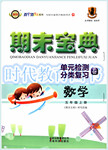题目内容
12. Ahead of us _____ a middle-aged woman in a bright green dress.
|
A.have |
B.has |
C.is |
D.Are |
【答案】
C
【解析】略

练习册系列答案
 期末宝典单元检测分类复习卷系列答案
期末宝典单元检测分类复习卷系列答案
相关题目
题目内容
12. Ahead of us _____ a middle-aged woman in a bright green dress.
|
A.have |
B.has |
C.is |
D.Are |
C
【解析】略

 期末宝典单元检测分类复习卷系列答案
期末宝典单元检测分类复习卷系列答案